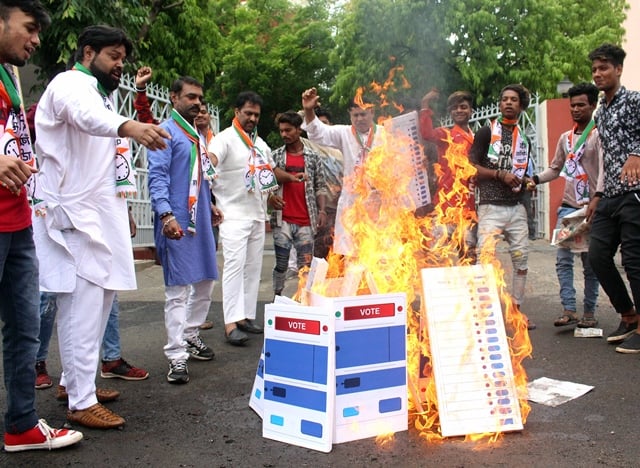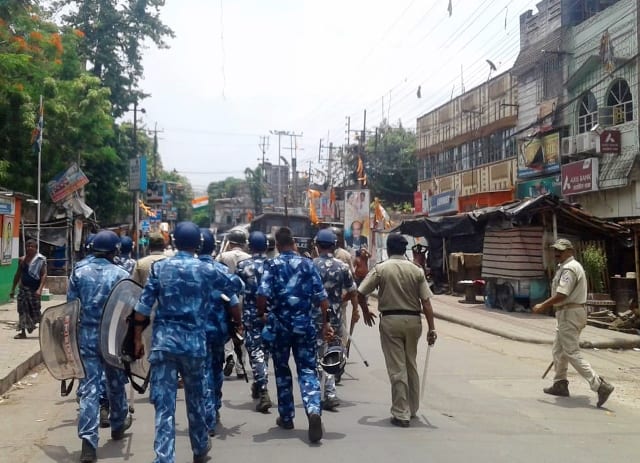
Month: June 2019

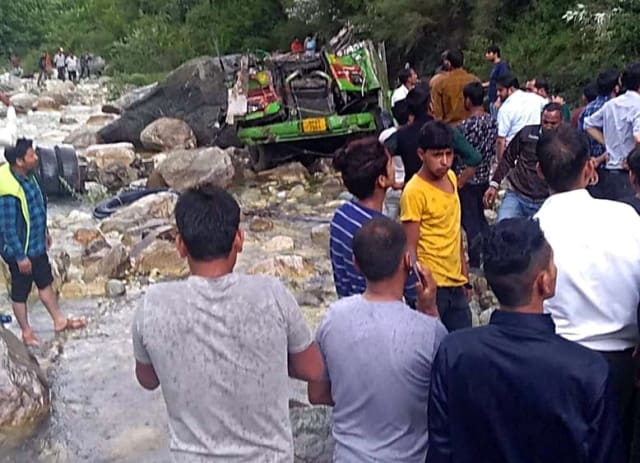
Over 40 Die In Himachal Bus Accident
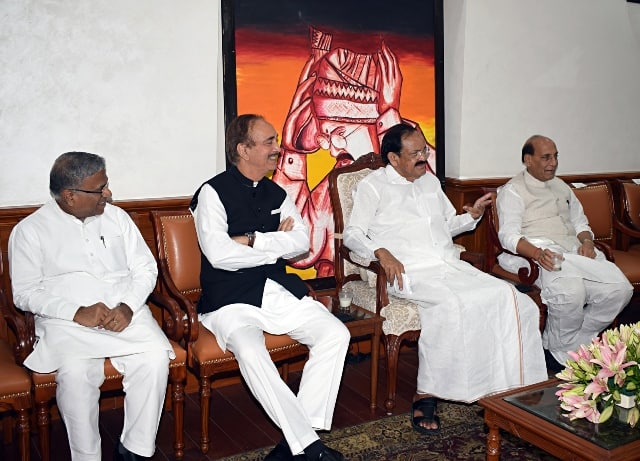
Naidu Hosts Lunch Ahead Of RS Session
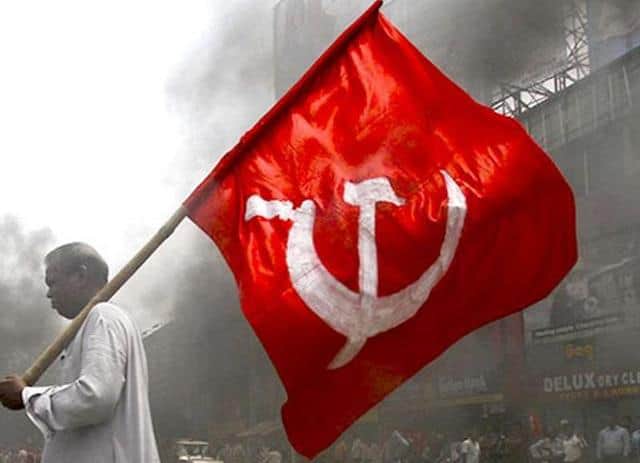
The Lal Salaam Era Is All But Over
Kanhaiya Kumar, who became the young mascot of India’s beleaguered Left after he was thrashed, imprisoned and faced the worst for never-proven charges of raising “anti-national slogans” three years ago, lost last month’s election by a huge margin. The victor, a Narenda Modi Government minister is notorious for his provocative utterances against the Muslims.
The contrast is obvious. It symbolizes changed times: consolidation of the political right and defeat of the Left, Left-of-Centre and the liberals.
Ideologies apart, Kumar’s defeat in Bihar is a resounding slap for the squabbling opposition parties that went by a misleading name, Mahagathbandhan (grand alliance). Not endorsing his candidature, some of them even fought him.
Unsurprisingly, Jawaharlal Nehru University (JNU) where Kumar led the students’ movement, will before long cease to be the Left’s bastion. A decade back, it was called “Kremlin on the Jamuna” by an American diplomat in dispatches back home, as per Julian Asange’s Wikileaks.
The whistleblower’s own fate hangs in balance. He readies for prosecution in another sign of what is a worldwide surge of ‘nationalist’ rulers who would rather shoot the liberals.
Kumar’s Communist Party of India (CPI) is among the world’s oldest, first founded in Tashkent in 1920 and then in India in 1925. The latter coincided with the birth of the Rashtriya Swayamsewak Sangh (RSS), whose ideology has triumphed, with Modi, most ministers and lawmakers across the country belonging to it.
Frequently banned by British colonial rulers, the communist activists worked under socialist and Congress banners, organising farm and industrial workers, staging plays and promoting ‘progressive’ literature and cinema.
India’s communists contributed significantly to evolution of the Marxist-Leninist principles of the global communist movement in the last century. But while interpreting and acting upon them, they also suffered numerous splits, throwing up a plethora of rival left groups, including four Revolutionary Socialist parties, with tendencies ranging from Bolshevik, Trotskyites and Maoists, to plain vanilla Marxist.
Their bigger problem has been approach to the two principal poles – Moscow and Beijing – and the biggest at home, to the Congress. The 1964 split, following the Sino-Indian conflict of 1962, created two communist mainstreams, the CPI and the CPI (Marxist). The more radical ones, meanwhile, continue to this day to confront the State with armed revolution.
In its parliamentary journey the Left has produced some of India’s best lawmakers. It was the principal opposition in the first three parliaments. The world’s first democratically elected communist government was formed in Kerala in 1957.
Vigorous pursuit of their different lines landed the two parties in opposite political camps. The CPI supported Indira Gandhi’s Emergency regime. After the defeat of Rajiv Gandhi’s government, the CPI (M) and the BJP joined hands behind Prime Minister VP Singh to keep the Congress out, both losing ground nationally during this brief period.
Claiming to be ‘scientific’ in their approach, the communists have, however, displayed serious contradictions – and they justify them. They opposed the Congress’ ‘authoritarianism’ in the past, just the way they oppose the ‘communal’ BJP today.
The CPI (M) was the kingmaker when then General Secretary, Harkishen Singh Surjeet, one of the most down-to-earth Marxists with a mind uncluttered by dogma, helped forge alliances that formed non-Congress, non-BJP governments at a time of political instability.
But its rigid hardliners have prevailed while dealing with ideologically different forces, refusing to share unless they have the upper hand. The CPI(M) hardliners, dubbed ‘Stalinists’ scuttled Jyoti Basu’s becoming the prime minister even as CPI’s ministers performed creditably. The cooperation between Left and other democratic parties has always been problematic.
The Left’s sun shone bright in 2004 with 61 parliamentary seats and a key advisory role that helped it push multi-billion anti-poverty schemes. But it fought the Manmohan Singh Government, even tried to oust it, to oppose India’s civil nuclear deal with the chief global bugbear, the United States. Somnath Chatterjee, the only communist Lok Sabha Speaker ever, was expelled. That marked the beginning of the end of its national role.
Despite long years of internal debate, the CPI(M) that leads the Left combine has failed to resolve its original contradiction: dealing with the Congress. It persists with West Bengal (Sitaram Yechuri) versus Kerala (Prakash Karat) line. The Left’s self-inflicted isolation has in the long run allowed BJP complete advantage.
West Bengal was lost in 2011 after 33 years of Left Front rule. The Left slumped to just 10 seats in the 2014 election. And then, the BJP stormed tiny Tripura. Across the east, cadres, even legislators and now long-time-loyal voter, have transferred their support, almost wholesale, to the BJP. With vote share down to seven percent, the Left scored a duck in 2019. The once-red region has turned largely saffron.
Its pockets elsewhere in the country long gone, only Kerala remains, but under siege from the BJP that has emerged as the third force threatening what has been a revolving door arrangement between two fronts. With the Left Front in power, the Congress snatched five seats from the CPI(M), including one for Rahul Gandhi, thus damaging the Left hugely, not the BJP.
Gopalkrishna Gokhale who mentored Mahatma Gandhi once said “what Bengal thinks today, the rest of India thinks tomorrow.” Is West Bengal going the BJP way judging by the party bagging 18 parliamentary seats? And is Kerala, India’s most literate – and politically mature – state with significant population of Muslims and Christians, too, heading in the same direction?
The combined Left tally of five is its lowest in parliamentary history. The CPI and the CPI(M) may lose their “national party” status. Worse, four of the five seats — two each of the CPI and the CPI (M) – were from Tamil Nadu, where both rode piggy-back on the regional major, Dravida Munnetra Kazhagam (DMK).
The Left’s decline was foregone. A pre-poll survey conducted by Lokniti-CSDS in the last week of March correctly showed that the BJP was set to improve its performance in West Bengal as compared to 2014. It did with an impressive 18. Irrespective of the numbers, it has damaged the Left, perhaps, irreparably. The Congress’s decision to go it alone in West Bengal and fielding Rahul in Kerala seriously hampered the Left’s prospects.
The decline is all-round. The Left together claims a million members. Compare that with the BJP’s 88 million, with or without the cadres of the affiliates. It claims to be the world’s biggest political party.
As elsewhere in the world, India’s middle class has grown richer, vocal and powerful. The State treats efforts at collective bargaining as law and order challenges. As millions are displaced from their homes, the corporates-controlled media has no sympathy for farm and industrial workers who fed the communist movement.
In the past, tens of thousands of Indians turned out for communist rallies, chanting proletarian slogans and wearing hammer and sickle neck chains with their Marxist-red t-shirts and hats. But today, the movement, after a century of struggle, is fighting a desperate survival battle. The “Lal Salaam” era is over.
The writer can be reached at mahendraved07@gmail.com
]]>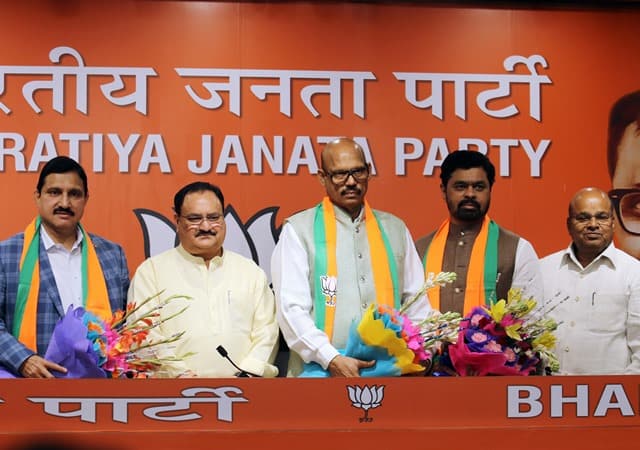
Jolt To TDP As 4 Elders Merge With BJP
Accompanied by BJP Working President J P Nadda and Leader of the House in Rajya Sabha Thawar Chand Gehlot, three MPs — Y S Chowdary, C M Ramesh and T G Venkatesh — met Rajya Sabha Chairman Venkaiah Naidu and submitted a resolution purportedly passed by the Legislature Party of Telugu Desam in the upper House where the merger decision was taken.
The fourth MP, G Mohan Rao, who is from Telangana, was not part of the delegation that met Naidu as he was stated to have suffered some injury.
The resolution said the Legislature Party met under the leadership of Chowdary and Deputy leader Ramesh. The TDP has six members in Rajya Sabha and three in Lok Sabha.
Notably, Chowdary was a Minister of State in the Modi government before TDP parted ways with BJP last year. He is facing a CBI probe in connection with a multui-crore bank fraud allegedly involving his company Crompton Engineering Projects Ltd. He has allegedly cheated Andhra Bank to the tune of Rs. 71 crore in 2017. The CBI had also raided his premises in Hyderabad earlier this month.
“Inspired and encouraged by the impeccable leadership Shri Narendra Modi and the development policies being pursued by him in the overall interest of the nation. We have desired to merge with the BJP with immediate effect under Paragraph 4 of the Tenth Schedule to the Constitution of India,” the resolution said.
It also said the meeting decided to write to the BJP President to accept the merger and convey his acceptance through a resolution to Rajya Sabha Chairman and to request him to allow the merger and “treat us as part of the BJP Legislature Party”.
Reacting to the development, TDP President N Chandrababu Naidu condemned “the attempts of BJP in weakening TDP”.
Later, the three MPs formally joined the BJP at the party headquarters and were welcomed by Nadda, Gehlot and General Secretary Bhupinder Yadav.
Nadda said the TDP MPs, who are leaders in their own right in Andhra Pradesh, have decided to merge with BJP inspired by the inclusive development plank of Modi and the organisational abilities of BJP President Amit Shah.
He said Shah has accpeted the proposal of the TDP MPs for the merger and accordingly “all of us met the Rajya Sabha Chairman and presented him the party’s decision to accept the merger proposal”.
“We believe in principled politics of inclusiveness and we will strongly support the efforts of the MPs in the development of Andhra Pradesh,” he said.
Chowdary, who addressed the media on behalf on behalf of the group, said the group of TDP MPs took the merger decision after being influenced by the leadership of Prime Minister Narendra Modi after the recent elections.
“The decision was taken in the interest of the country and especially Andhra Pradesh. The state is facing various issues related to the bifurcation of the state and we want to see their implementation without confrontation and with cooperation.”
The press conference was brought to a close abruptly when reporters started asking some questions about the case being faced by Chowdary.
(ANI)
]]>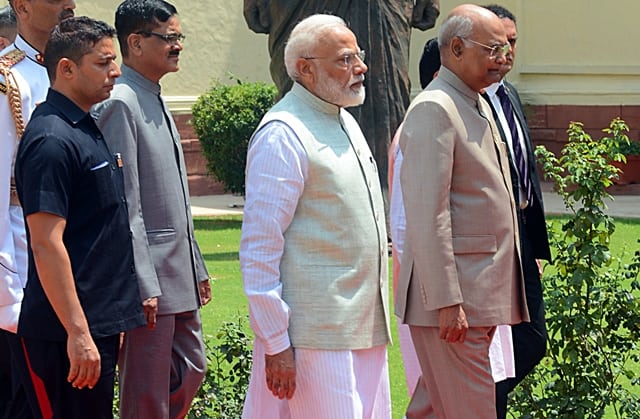
End Triple Talaq, Ensure Equality: Kovind
“To provide equal rights to the women, it is imperative to eliminate evil practices such as ‘triple talaq’ and ‘nikah halala’. I would urge all the members of the parliament to help bring a change and ensure a better and respectable future to the daughters of our country,” he said.
ALSO READ: ‘I Was Given Talaq For Dowry’
The President gave his customary address to Parliament in the historic Central Hall after the formation of the 17th Lok Sabha.
“Empowerment of the women is the top priority of my government. The empowerment of the women and their effective participation in the economy and in society is the real test of a developed nation. Under the National Livelihood Mission, more than two lakh crore has been given to approximately three crore women living in rural areas so far,” he added.
ALSO READ: Cong Finds Lacunae In Talaq Bill
In his 60-minute speech, the President also spoke about the ongoing water crisis in the country and stressed that there is a dire need for the country to work towards water conservation.
“The water conservations in India are disappearing at a faster pace. In lakes and ponds, the water is depleting, therefore, resulting in the escalation of the water crisis for the poor. We must save water for our future generation. The formation of the new ‘Hydropower Ministry’ is a good move and will have far-reaching benefits,” he said and added, “We (The government) are ensuring to provide clean drinking water and water availability for agriculture.”
ALSO READ: Urban Dystopia Ahead In India
After extending his heartiest congratulations to all newly elected Members, the President highlighted the various initiatives taken by the Centre in the last five years stating that the government created opportunities for poorer sections of the youth in education and of appointment.
The President also added that under the Prime Minister’s Mudra Yojana, around 19 crore loans have been given so far for self-employment adding that the scheme will now be expanded to as many as 30 crore people.
“A loan plan of up to Rs 50 lakh will also be introduced without guarantee for entrepreneurs,” he added.
Kovind said his government is committed to improving the lives of the people residing across India.
“The people of the country have given a very clear mandate in the elections. After evaluating the government’s first term, the countrymen have given even stronger support for the second time. By doing so, the countrymen have mandated the development journey since 2014 to be unimpeded and fast-moving,” he said.
“From day one, my Government is committed to the goal of improving the lives of all the countrymen, removing their sufferings from misgovernance and providing all the necessary facilities to the last man of the society. My government worked on Sabka Saath, Sabka Vikas,” he added.
President Kovind also touched about the issue of growing menace of terrorism and said that the country had demonstrated its intentions and capabilities by carrying out air strikes on terrorist targets across the border, first by carrying out surgical strikes and second the Pulwama attack. ” In the future also, my government will take all requisite steps to protect the nation. National security is paramount for my government.”
“Today, the entire world is supporting India on the issue of terrorism. UN declaring Masood Azhar — who was responsible for several major terror attacks in the country, is great proof,” he added.
He also talked about the economic offenders who have fled the country saying that the government is making efforts to acquire information from 146 nations including Switzerland. ” For all those who have black money, we are getting information about them. The campaign to against black money will be carried out at a faster speed now. In the past two years, more than 4 lakh 25 thousand have been disqualified.”
In his concluding remark, President Ram Nath Kovind called for deliberation on “One Nation, One Election” citing that it will help India to grow faster and all the political parties will be able to carry out their task of welfare and development for the people in accordance with their respective ideologies.
“I urge all the MPs to seriously consider the development-oriented proposal of ‘one nation – one election together,” he said.
The Parliament’s Budget Session, which began on June 17, will continue till July 26. The Economic Survey will be presented on July 4 followed by the Union Budget for 2019-20 on July 5.
(ANI)
]]>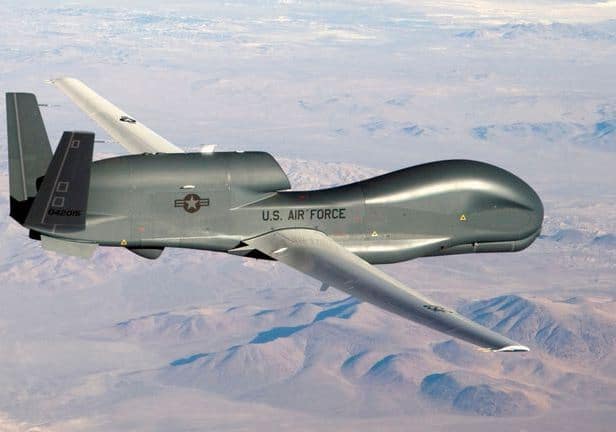
Iran Says It Has Shot Down US Drone
The Northrop Grumman RQ-4 Global Hawk spy drone was shot down by the IRGC after it entered the Iranian airspace near the Kouhmobarak district, according to a report by Islamic Republic News Agency (IRNA).
There has been no confirmation yet about the development from Washington, however, a spokesman for US Central Command has insisted “there was no drone over Iranian territory,” reports New York Post.
The development comes at a time of heightened tensions between Tehran and Washington owing to a recent attack on two oil tankers in the Gulf of Oman. Although it remains unclear who was responsible for the attacks, the US has put the blame on Iran, which, in turn, has denied the allegations.
To back its claim, the US released a blurry video which, the country believed, showed the boat crew of Islamic Revolution Guards Corps (IRGC) removing an unexploded mine from one of the tankers shortly after the attack.
The US stance was echoed by Saudi Arabia and Britain. Russia, on the other hand, came to Iran’s support and warned against “hasty conclusions” over the incident.
Furthermore, Washington recently announced the deployment of about 1000 additional troops to the Middle East for “defensive purposes to address air, naval, and ground-based threats” in the region following the attack on the oil tankers.
US military is increasing its presence in the Middle East. Recently, country’s Secretary of State Michael Pompeo confirmed the approval of USD 8.1 billion in arms transfers to Saudi Arabia, Jordan and the United Arab Emirates amid hostilities with Iran. In addition, carrier strike warships and B-52 bombers were also recently deployed off the coast of Fujairah in the United Arab Emirates.
(ANI)
]]>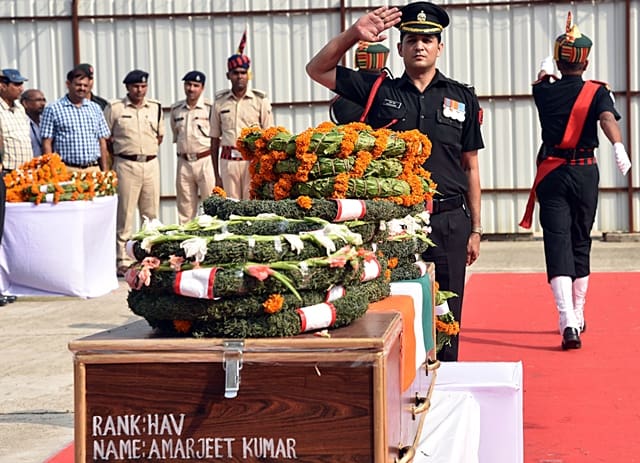
Salutations To The Fallen Soldier
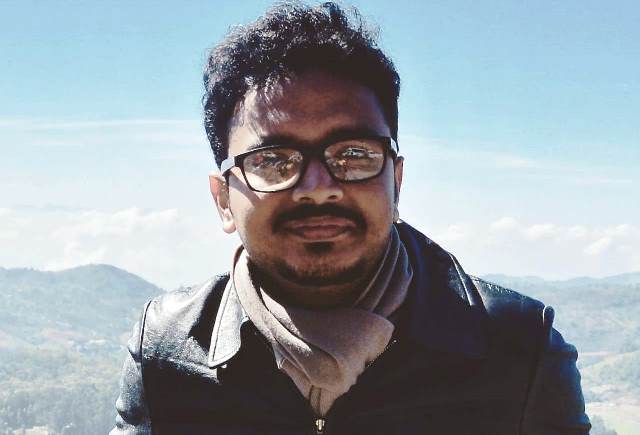
‘Patients Need Grievance Redressal’
Dr Avishek Layek, 25, a junior resident at NRS Medical College was actively involved in the doctors’ strike in Kolkata. He says the attack on a doctor was only a flashpoint, the discontent was simmering for long
What would you do if a shopkeeper sells you a defective food item and you fall sick after consuming it? Would you go and beat up the shopkeeper? Or will you go through consumer grievance redressal channels and file a case at the consumer court? Most sane people would choose the latter. No?
Unfortunately, in cases of medical negligence, the absence of a patient grievance redressal system leaves people without any options. This leaves, us, the doctors, vulnerable to attacks from aggrieved relatives of patients. What happened at NRSMCH on June 10 was not something new. The incident at our hospital sparked a movement that created ripples across the nation. It wasn’t just the junior doctors (as reported by some sections of media and government) who were agitated and involved in the strike. The movement got support from the people, who work at the grassroots level — be it Aasha workers or the paramedics.
Everyone is a part of the public health delivery system in the country lend their voice to the movement. And the reason for this overwhelming support stems from the fact that the entire medical fraternity is frustrated with the current system.
ALSO READ: ‘Doctors Can’t Perform At An Unsafe Workplace’
I was actively involved in the movement and was part of all the meetings that took place between the doctors and representatives of the state and central government. Our objective was not to paralyse the healthcare delivery system of the state, but we wanted to bring to attention the pathetic conditions in government hospitals. Better patient care services is the need of the hour, which will in return assure a safe, healthy workplace for doctors.
Certain sections tried politicising the issue by giving it a communal colour. Sections of the media, social media and government aver that the movement took this leviathan shape only because one doctor was seriously injured. Some people even said that we were enjoying a week off. This is not true. The movement raised genuine issues that struck a chord with every health worker/ doctor, who was agitated with the current state of affairs in the healthcare system. Beating up doctors has become a norm, which needs to be changed.
Increasing salaries of junior doctors or reducing the long work hours are some pressing issues that need to be dealt with, but we deliberately left out those issues during our talks with the government. For doctors, ensuring better care for patients is of utmost importance and is our primary demand. A doctor’s education is never complete, we learn everyday by treating patients. And thus, it is crucial to create an environment where patients can trust doctors and have faith in the public health delivery system. If there is a mishap, the patient party must have a dedicated place where their grievances are addressed.
Right now for cases of medical negligence, the only way the patient party can register their grievance is by filing a case in the court. These cases tend to go on for several years, as a result people refrain from approaching the court. In fact, none of the law colleges in India have dedicated courses on medical law and ethics. The easiest way out for the aggrieved party is to beat up the doctors.
Another important issue we raised was about security in hospitals. All hospitals must hire a private security agency. In times of crisis, such as the incident that occurred at NRS, we feel rather helpless and vulnerable. Railways have their own railway police, border areas have BSF. Industries have CISF, but government hospitals have been royally ignored in this aspect.
We, doctors, constitute one percent of the population and we have to cater to 100 percent of the population, of course, that leaves room for error. Doctors do not want to play God. We humbly accept that there can be fault at every level. But is it wise to resort to violence in response to a human error?
So far, we were successful in raising these issues both at the state and national level. We have got assurances, now we need to see how they are implemented.
